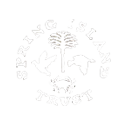Living with Wildlife
Rookeries are relatively small areas in which large numbers of water birds congregate to nest. They are typically located in a place where it is difficult for predators to reach, such as an island or a group of trees located over water. A healthy heron-egret rookery in the lowcountry usually has a healthy alligator population present, which deters other predators.
During the severe drought of 1998-2003 herons and egrets abandoned rookeries in the region’s cypress swamps. In 1999 a few egrets began nesting in wax myrtle bushes overhanging the water at Night Heron Pond. The size of this colony quickly grew. In 2002 the birds moved to the island on the 16th fairway, which was created during the golf course’s construction to provide a rookery habitat. In 2012 wood storks, a federally protected species, moved into this rookery and by 2014 there were more than 55 wood stork nests.
Nesting birds create a heavy nutrient load that can cause algae blooms in ponds. Decaying algae can cause an obnoxious odor and a fish kill when the algae consumes the pond’s oxygen. To solve this problem at the 16th fairway pond, the POA installed an aeration system that uses submerged pumps to circulate the water. This has become a model for other communities with rookeries.
Another problem with rookeries is the high concentration of guano that kills the trees in which the birds are nesting. Adding several tons of lime per acre helps to neutralize the acidity of the accumulated bird droppings, but this must be applied during the non-nesting season. Inevitably some trees die and are subsequently replaced by species that are more tolerant of low pH conditions.
Roosts are areas where large numbers of birds congregate for the night or, in the case of some birds, when high tides prevent them from feeding. In the case of egrets, herons, ibis and storks, a rookery may become a roost after the breeding season is over.
Turkey vultures and black vultures also establish nighttime roosts. This can become a problem when they select a resident’s rooftop and their voluminous amounts of foul-smelling excrement pile up. The best solution to this problem is to scare birds off with loud noises as soon as they select a house as a roost.

Copyright © Spring Island Trust
40 Mobley Oaks Ln. · Okatie, SC 29909 · 843-987-7008
Site by Sans Sheriff Studio
